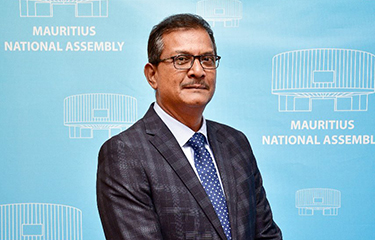The government of Mauritius has launched new investment opportunities for private investors interested in developing the country’s semi-industrial demersal species fishing and processing sector.
The Mauritius Ministry of Blue Economy, Marine Resources, Fisheries, and Shipping has launched an expression of interest seeking private companies with the capacity to “sustainably exploit the shallow-water demersal resources, mainly whitefish of the genus Lethrinus on the fishing banks of Nazareth, Albatross, Saya de Malha, St Brandon, but excluding inshore waters of Soudan and Hawkins, using handlines.”
Bidders have until 2 February, 2023, to submit an application to allow them to invest in "exploit[ation] of the demersal resources in the exclusive economic zone of Mauritius and other fishing grounds permitted though specific fishing agreements,” the ministry’s acting senior chief executive, Boodhun Maubarakahamad, said.
Preferred bidders would sign an agreement with the government and commit to strictly abide by Mauritian laws, and ensure all catch is unloaded at the Trou Fanfaron Fishing Port for subsequent processing within Mauritius.
“Consideration will also be given to cooperatives of existing fishers, companies training and hiring Mauritian fishers and citizens, companies involved in high value-addition processing, companies maximizing their investments, and job creation,” Maubarakahamad said.
Mauritius has also offered to sweeten the business opportunity by providing “yearly financially sustainable quotas for each company, which may be renewed, for de-risking financing for processing facilities.”
The demersal exploitation shall be maximized on the nation’s fishing banks “through an ecological approach to fisheries while ensuring to stay within the limits of Maximum sustainable yields," according to the call for proposals.
Despite Mauritius having a huge exclusive economic zone, with potential to produce up to 6,000 metric tons (MT) of demersal fish, the country’s current capacity is estimated at only 1,200 MT.
Mauritius Fisheries Minister Sudheer Maudhoo said in a recent report Mauritius needs the country’s youth “as well as investors to join the fisheries sector to explore the 2.3-million-square-kilometersof EEZ that is at our disposal to ensure the food security of the population.”
Should Mauritius attract investors to develop its demersal resource, the country would be back on track to increasing its fish production to meet local demand, reduce dependencies on seafood imports, and create an enabling environment for data collection related to the country’s fisheries considered useful in studies on stock assessment and management.
Currently, Mauritius’ per capita consumption of fish is approximately 28 kilograms per person, with the national total fish production estimated at 29,000 MT of fish through coastal, demersal, and pelagic fisheries. At least 86 percent of the fish caught in Mauritius' EEZ are sold on the local market, while the remaining 14 percent are from marine aquatic farms aimed for international markets, according to government reports.
Separately, Princes Tuna Mauritius (PTM), an affiliate of Mitsubishi Corporation’s Princes Group, reported it has achieved the milestone of having 100 percent of all its Princes’ branded tuna identified as responsibly sourced, meaning it is from a fishery that is ceritified by the Marine Stewardship Council, engaged in a fishery improvement project working towards MSC certification, or from verified fish-aggregating device-free or pole-and-line sources
PTM enlarged its tuna-processing operation in the Indian Ocean region in 2021. Also in 2021, Princes also reached its goal of reducing its Indian Ocean yellowfin tuna sourcing by 50 percent on 2017 levels, a year ahead of its 2022 deadline, to support the long-term sustainability of the stock there.
At the same time, the company, Princes Group Managing Director Cameron Mackintosh said the company, completed the conversion of all Princes brand tuna sold in the Netherlands to be MSC-certified in 2022.
“In 2022, we also reaffirmed our direct involvement in improving tuna sustainability in the Indian Ocean – our most-important tuna sourcing region – through a further year’s extension of the Sustainable Indian Ocean Tuna Initiative (SIOTI) fisheries improvement Project (FIP),” Mackintosh said.
Elsewhere in Mauritius, PTM has made strides towards the Princes Group’s target of increasing international energy generation up to 50 percent as part of its new "2030GreenGoals" initiative. The company is striving to use more renewable energy sources to cut operational costs and achieve carbon neutrality by 2030.
PTM has partnered with Mauritius-based bio-plant venture Energie des Mascareignes (EDM) to reduce its CO2 emissions by 8,650 MT per year at the company’s tuna-processing facility in the country, at an estimated cost of EUR 12 million (USD 12.9 million).
“This represents 80 pecent of the current operational emissions for PTM’s largest manufacturing site and will be achieved by starting to convert all semi-solid waste from PTM sites, alongside effluent water, into biogas via anaerobic digestion from 2023 onwards,” Mackintosh said.
Photo courtesy of the Mauritius National Assembly







